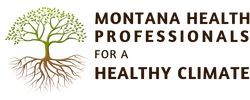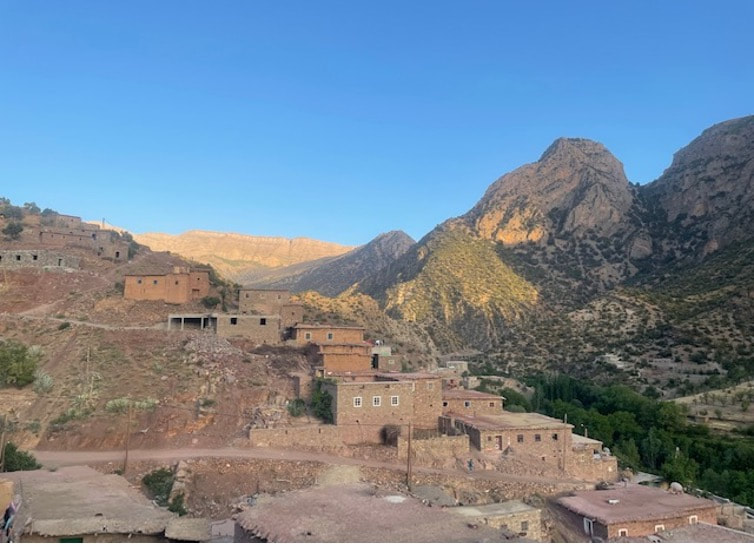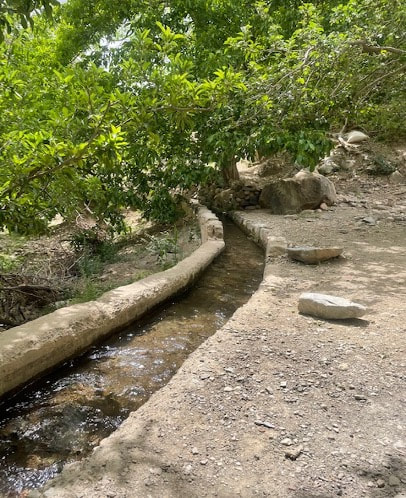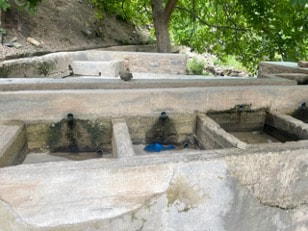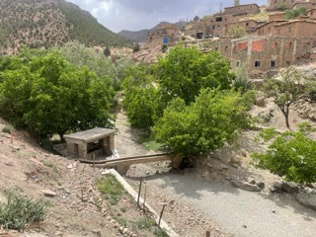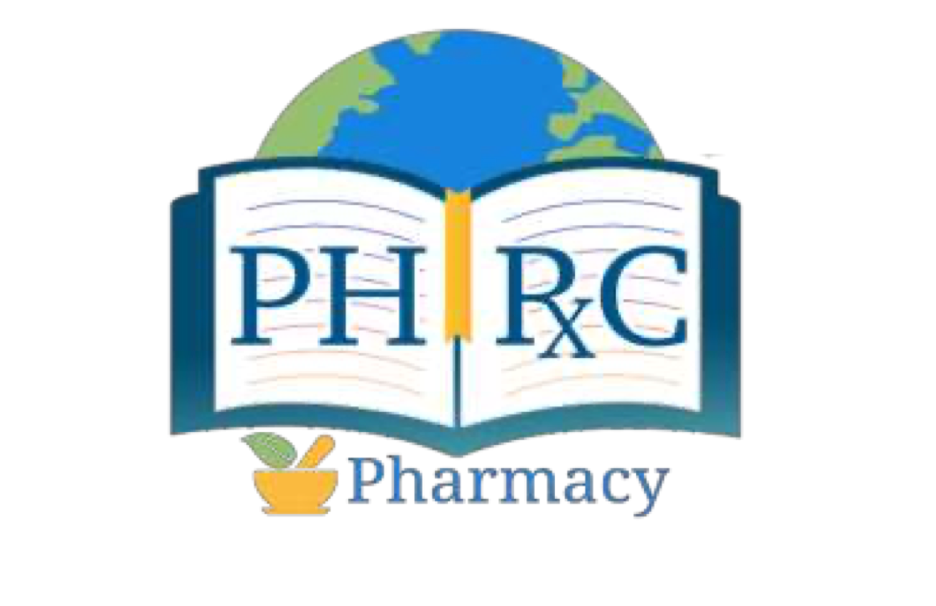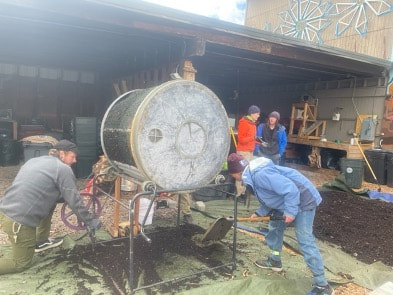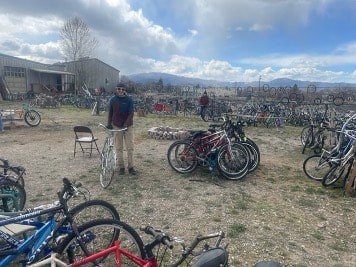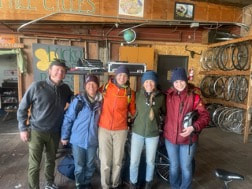Student Corner Update (April – May 2022)
Greetings from Morocco! I am here in the rural community of Zawiya Ahansal in the High Atlas Mountains as part of a public health course with the University of Montana. Our small student group is here to learn about the various public health initiatives that have been developed and implemented by the community over the last decade in collaboration with the Atlas Cultural Foundation.
Atlas Cultural Foundation
The mission of the Atlas Cultural Foundation is to engage in collaborative partnerships with rural Moroccans to support cultural preservation efforts, community education, and public health initiatives in the region of Zawiya Ahansal.
Greetings from Morocco! I am here in the rural community of Zawiya Ahansal in the High Atlas Mountains as part of a public health course with the University of Montana. Our small student group is here to learn about the various public health initiatives that have been developed and implemented by the community over the last decade in collaboration with the Atlas Cultural Foundation.
Atlas Cultural Foundation
The mission of the Atlas Cultural Foundation is to engage in collaborative partnerships with rural Moroccans to support cultural preservation efforts, community education, and public health initiatives in the region of Zawiya Ahansal.
The community of Zawiya Ahansal in the High Atlas Mountains of rural Morocco
Human Health and Climate Change in Zawiya Ahansal
Many of the public health initiatives in Zawiya Ahansal have an explicit focus on the interconnections between the health of the environment and the wellbeing of its community members. These programs are making tangible improvements not only in the quality of life of local residents, but the sustainability of natural resources in the region. In this month’s student corner update, we highlight just a few of these inspiring community-led initiatives. For more information about the Atlas Cultural Foundation and the community of Zawiya Ahansal, visit http://atlasculturalfoundation.org
Water Quality and Waste Management
Less than a decade ago, community members in Zawiya Ahansal had limited access to indoor plumbing for toilets as well as doing laundry and washing carpets, as there was no system available to transport local spring water into the homes of residents. However, the community’s relationship to water has changed dramatically since the Agoudim Association for Potable Water began in 2014. Consisting of a dedicated team of community members, the association worked with the Moroccan government to install solar-operated pumps that pipe water from the community’s spring into every home. The association charges a very small monthly fee for every family to receive running water in their homes, however, families with financial barriers are not required to pay the initial hook-up fee for indoor plumbing. This sliding scale fee process ensures that price is not an obstacle for any family and has made it possible for no one to go without running water. At the same time, since families are paying for their water, the Agoudim Association president, Mohammed, reported to our team that the community is invested in conserving water and not wasting it. The entire community of Zawiya Ahansal manages to only use 1000 tons of water on average per month. As drought continues to be an issue in Morocco with climate change, the community’s new system ensures that less water is wasted through any excess usage. Additionally, ACF’s implementation of a community garbage collection and processing program has ensured that less pollution finds its way into the waters of Zawiya Ahansal. Finally, ACF’s installation of community washing stations for laundry and carpets further supports community sanitation, hygiene, and efforts to maintain the health of the local river. Overall, these initiatives have led to less water-borne illnesses, water conservation, and supports improved health outcomes for residents.
The community of Zawiya Ahansal in the High Atlas Mountains of rural Morocco
Human Health and Climate Change in Zawiya Ahansal
Many of the public health initiatives in Zawiya Ahansal have an explicit focus on the interconnections between the health of the environment and the wellbeing of its community members. These programs are making tangible improvements not only in the quality of life of local residents, but the sustainability of natural resources in the region. In this month’s student corner update, we highlight just a few of these inspiring community-led initiatives. For more information about the Atlas Cultural Foundation and the community of Zawiya Ahansal, visit http://atlasculturalfoundation.org
Water Quality and Waste Management
Less than a decade ago, community members in Zawiya Ahansal had limited access to indoor plumbing for toilets as well as doing laundry and washing carpets, as there was no system available to transport local spring water into the homes of residents. However, the community’s relationship to water has changed dramatically since the Agoudim Association for Potable Water began in 2014. Consisting of a dedicated team of community members, the association worked with the Moroccan government to install solar-operated pumps that pipe water from the community’s spring into every home. The association charges a very small monthly fee for every family to receive running water in their homes, however, families with financial barriers are not required to pay the initial hook-up fee for indoor plumbing. This sliding scale fee process ensures that price is not an obstacle for any family and has made it possible for no one to go without running water. At the same time, since families are paying for their water, the Agoudim Association president, Mohammed, reported to our team that the community is invested in conserving water and not wasting it. The entire community of Zawiya Ahansal manages to only use 1000 tons of water on average per month. As drought continues to be an issue in Morocco with climate change, the community’s new system ensures that less water is wasted through any excess usage. Additionally, ACF’s implementation of a community garbage collection and processing program has ensured that less pollution finds its way into the waters of Zawiya Ahansal. Finally, ACF’s installation of community washing stations for laundry and carpets further supports community sanitation, hygiene, and efforts to maintain the health of the local river. Overall, these initiatives have led to less water-borne illnesses, water conservation, and supports improved health outcomes for residents.
One of Zawiya Ahansal’s many historic
water channels running through the village
water channels running through the village
Community wash station constructed by the Atlas Cultural Foundation
and community partners
and community partners
Community wash station
Planetary Health Report Card
The Planetary Health Report Card is an international, student-drive, metric-based initiative to inspire planetary health and sustainable healthcare education engagement in medical schools.
For more about the planetary health report card, visit: http://phreportcard.org
In April, Montana Student Health Professionals for a Healthy Climate, with the support an leadership of our faculty mentor Hayley Blackburn, completed a planetary health report card (PHRC) assessment for the pharmacy school at the University of Montana. The purpose of these assessments was to determine the degree to which the pharmacy school currently engages with communities most affected by climate change and environmental injustice as well as see to what degree the school currently advocates for sustainable healthcare practices through its curriculum to reduce environmental waste.
Leaders from the nation-wide PHRC initiative assessed the University of Montana’s submission and provided UM’s pharmacy school with a letter grade of “B –“ for its various planetary health and climate change oriented coursework and initiatives.
To read the full planetary health report card for the University of Montana, visit:
http://phreportcard.org/pharmacy-pilot/
Planetary Health Report Card
The Planetary Health Report Card is an international, student-drive, metric-based initiative to inspire planetary health and sustainable healthcare education engagement in medical schools.
For more about the planetary health report card, visit: http://phreportcard.org
In April, Montana Student Health Professionals for a Healthy Climate, with the support an leadership of our faculty mentor Hayley Blackburn, completed a planetary health report card (PHRC) assessment for the pharmacy school at the University of Montana. The purpose of these assessments was to determine the degree to which the pharmacy school currently engages with communities most affected by climate change and environmental injustice as well as see to what degree the school currently advocates for sustainable healthcare practices through its curriculum to reduce environmental waste.
Leaders from the nation-wide PHRC initiative assessed the University of Montana’s submission and provided UM’s pharmacy school with a letter grade of “B –“ for its various planetary health and climate change oriented coursework and initiatives.
To read the full planetary health report card for the University of Montana, visit:
http://phreportcard.org/pharmacy-pilot/
Climate Bike Ride and Volunteer Day
In April, the Montana Student Health Professionals for a Healthy Climate organized a climate bike ride/volunteer day. A small group of University of Montana students met on campus and biked to Soil Cycle and Free Cycles for a fun and engaging day of volunteer work. At Soil Cycle our team spent the morning shifting and sorting compost, along with assisting the Soil Cycle team with preparing bags of compost for delivery.
In April, the Montana Student Health Professionals for a Healthy Climate organized a climate bike ride/volunteer day. A small group of University of Montana students met on campus and biked to Soil Cycle and Free Cycles for a fun and engaging day of volunteer work. At Soil Cycle our team spent the morning shifting and sorting compost, along with assisting the Soil Cycle team with preparing bags of compost for delivery.
The Montana Student Health Professionals team sorting compost at Soil Cycle
About Soil Cycle: www.soilcyclemissoula.com
Soil cycle offers collection of food scraps and waste for the Missoula area. Soil Cycle’s composting services and educational programming promote sustainable living and helps divert waste from landfills.
About Soil Cycle: www.soilcyclemissoula.com
Soil cycle offers collection of food scraps and waste for the Missoula area. Soil Cycle’s composting services and educational programming promote sustainable living and helps divert waste from landfills.
In the afternoon our team went to Free Cycles and helped organize the “Bicycle Forest,” an impressive and expansive field of donated bicycles and bicycle parts.
Montana Student Health Professional President, Amelda Klink, organizing the Bicycle Forest
About Free Cycles: www.freecycles.com
The Free Cycles Community Bike Shop in Missoula focuses on reusing and repurposing bicycles to reduce pollution and promote social change and empowerment.
About Free Cycles: www.freecycles.com
The Free Cycles Community Bike Shop in Missoula focuses on reusing and repurposing bicycles to reduce pollution and promote social change and empowerment.
The Montana Student Health Professionals team at Free Cycles.
Stay tuned for more updates from the Student Corner this summer!
Stay tuned for more updates from the Student Corner this summer!
